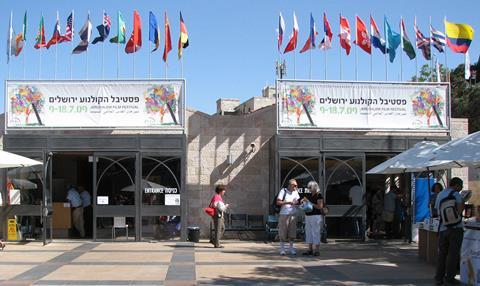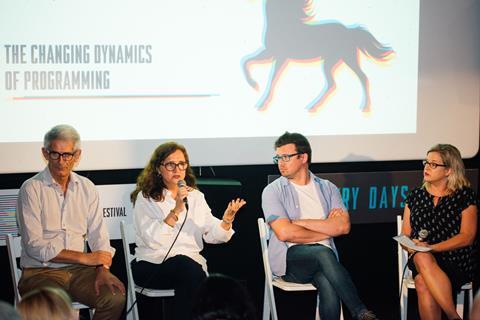This year’s Think Fest - Jerusalem Film Festival’s platform to discuss the future of film festivals - kicked off with a discussion about how filmmakers can implement an effective festival strategy.

Gordon Spragg, a partner at publicity and marketing film Wolf Consultants, said that filmmakers should be thinking about festivals as early as the production stage. However, Anna Purkrabkova, program coordinator at Karlovy Vary International Film Festival, cautioned that applying to festivals too early is a misstep. “Programmers don’t want to see the film twice,” she said. “When it’s [picture] locked, that’s the perfect stage for us.
Failing to get into your first-choice festival is also not the end of the world, moderator Wendy Mitchell suggested, using the example of UK films not making the Toronto programme and subsequently aiming for Sundance or Berlin. Spragg added that there are numerous opportunities to launch a film. “Not all projects are destined for Cannes. Every village has its own film festival now,” he said.
Read more: Jerusalem Think Fest: how do film festivals navigate complex political climates?
The panel unanimously agreed that having the right promotional materials is key to any festival application. “I can talk for an hour about the importance of good unit photography,” said Mitchell on imagery. Added Spragg: “You need to go through the script, think about how you represent the film visually. It’s one of the most essential aspects of launching a film. We discuss it with the filmmaker and sales agent for weeks and months.” Purkrabkova noted that Karlovy Vary will offer assistance with posters and materials, if the filmmakers require it.
“It’s amazing that we work in a visual industry and we work for years on our film and when you ask for the image that represents the film, it’s a blank,” commented Claudia Landsberger, executive partner, BaseWorx For Film. “It’s going to sell your film, you should give it as much attention as making your film, which is only half the battle. The film could stay on the shelf for the rest of its life if you don’t have anything to promote it.”
When to make your selected visuals public is also key, agreed the panel. Landsberger used the example of Carlos Reygadas’ Japon, on which she had worked at the 2002 edition of Cannes. On one specific day during the festival, they had taken adverts in every film trade magazine to deliver the biggest splash possible. “Everyone was talking about it,” she recalled.
After the image, the synopsis is the next key ingredient of the strategy, said Spragg: “It’s the first wave of attack, it’s how people will understand the film. We work on it a lot.”
Think Fest: how festivals play the numbers game
Often overlooked when it comes to discussing the challenges that face film festivals is the sheer volume of content that needs to be sifted through to curate a programme.

On the day’s final panel, Charles Tesson, artistic director of Cannes’ Critics’ Week, said his programming team receives 850 feature submissions a year, from which they select seven films for its competition strand and a further three to four for non-competitive slots. Tesson noted that the amount of submissions was growing, though not at a significant pace, due to Critics’ Week’s requisite for only first and second features, as well as world premiere berths.
Ilda Santiago, festival director of Rio de Janeiro International Film Festival, programmes 200-250 films for her event’s international strand, as well as another 50 in a sidebar of Brazilian titles. The increasing number of submissions to sift through was making it “easier to miss a gem”, said Santiago, who added that audiences, press and sponsors were keen to see the big hits from other major festivals around the world, making it “challenging to keep originality” in the line-up.
Javier Porta Fouz, artistic director of the Buenos Aires International Festival of Independent Cinema (BAFICI), programmes up to 400 films per year. He acknowledged that the amount was “too many” and that his team has attempted to limit the number of submissions, initially by adding an entry fee (a notion quashed by BAFICI’s government funders) and then by introducing a shorter period for submissions, which has been successful.

























No comments yet